On Sine Die, a frenzy of lawmaking and a few moments of celestial Zen
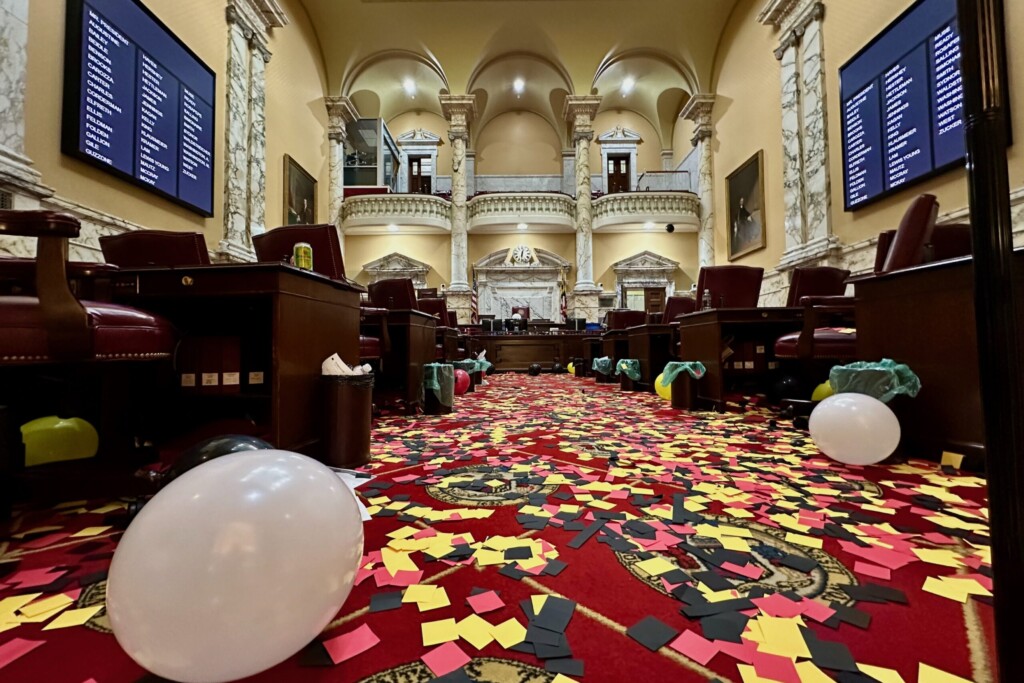
Legislation to aid workers and businesses during the disruption at the Port of Baltimore and another bill allowing for a state takeover of Pimlico Racetrack beat Monday’s midnight deadline despite being introduced late in the General Assembly session.
Lawmakers had already passed roughly 500 bills by the last day of the 90-day session. Even so, several important late-filed bills remained for lawmakers to act on in the closing hours as midnight approached.
“I think that it’s really evidence of how we approach this session of being responsive to people’s needs,” said Senate President Bill Ferguson (D-Baltimore City). “This was a session where there weren’t groundbreaking revolutionary things. It was about really responding to the important moment in time that Maryland is experiencing…It was really responding to Marylanders’ needs and not doing it in a way that would shake the system.”
The Senate, with less than an hour left, voted unanimously to accept Senate Bill 1188 as amended by the House.
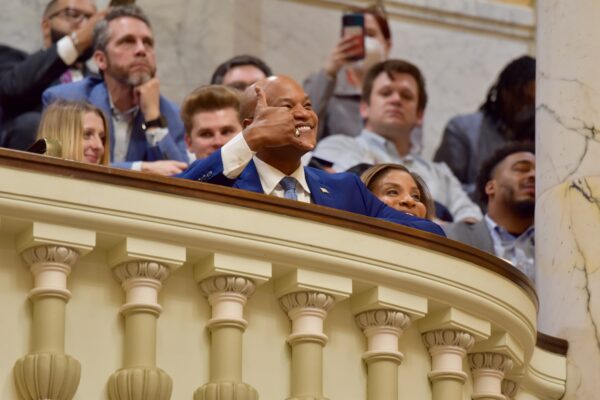
Gov. Wes Moore (D) and his wife Dawn Moore watch the final moments of the 2024 session from the Senate gallery. Photo by Bryan P. Sears.
The bill, and its companion HB 1526, were introduced last week following the collapse of the Francis Scott Key Bridge. The Senate passed the House bill in the final seconds of the session Monday, with Gov. Wes Moore (D), Lt. Gov. Aruna Miller (D) and their spouses sitting in the Senate gallery.
It was the last bill acted on by the upper chamber.
The bills authorize the governor to use up to $275 million from the state’s Rainy Day Fund. The money would then be used to offset wage losses by employees of the port, independent contractors, and port dependent businesses during the disruption at the Port of Baltimore.
A House amendment allows the funds to be drawn on in $25 million increments. A legislative policy committee would have to be given seven days’ notice before each withdrawal. The committee, which cannot veto the spending, can request a briefing from the executive branch before withdrawals are made.
“I thought that was a good safeguard,” said Senate Minority Leader Stephen S. Hershey Jr. (R-Upper Shore).
As emergency legislation, the bill would take effect as soon as Moore signs it.
The first of several bill signings is scheduled for Tuesday afternoon. Some of the first bills to be signed could include the $63 billion spending plan for fiscal 2025 and bills focusing on service, according to a Moore spokesperson.
The legislature came to an agreement on a spending package that does not include personal, property or corporate tax increases or iGaming. It does, however, raise more than $2 billion over five years through higher tobacco taxes and various fee increases, particularly on vehicle registrations.
The governor, speaking to reporters on Monday afternoon, 10 hours before the close of session, declared victory, saying he was “on pace to accomplish every single one of the bills that we introduced, that we’re on pace now to getting not just getting them all passed with bipartisan support.”
“We opened up session saying that we really have four goals,” said Moore. “We need to make Maryland more safe. We need to make Maryland more affordable, and make Maryland more competitive. And we needed to make continue to make Maryland state that serves. I think on all four of those goals, we made very real progress.”
Pimlico bill crosses finish line after the eclipse
Hours before the two chambers adjourned Sine Die at midnight, House and Senate committees began meeting Monday morning. The House gaveled in for its first floor session shortly after 10:30 a.m.; the full Senate first met just after noon.
House Speaker Adrienne A. Jones (D-Baltimore County) opened the House session by paying tribute to her predecessor, the late House Speaker Michael E. Busch (D), noting that he died the day before Sine Die in 2019.
“I’m confident Mike would have been proud of the work we’ve accomplished,” she said. “As Mike used to say, ‘Who’s better than us?'”
Then it was a full day of business — except for a brief period in the middle of the afternoon, when House and Senate recesses coincided with the total eclipse of the sun. Hundreds of lawmakers, staffers, lobbyists and advocates spilled on to Lawyers Mall, State Circle and Maryland Avenue with their special eclipse glasses, creating a celebratory atmosphere like a 1960’s be-in.

Left to right: Sens. Mary Washington, Benjamin Brooks and Mary Beth Carozza gaze into the sky watching the solar eclipse outside the Maryland State House on April 8, 2024. Photo by William J. Ford.
Then it was back to work.
Another significant late-filed bill that the legislature passed on Monday clears the way for a state takeover of Pimlico Race Course in Baltimore and the Preakness.
The bill headed to the governor includes $400 million in bonds that will be used to raze and then rebuild Pimlico. The race will be run by a nonprofit arm of state government, which will license the Preakness from Canada-based Stronach Group, the current owner.
“We think this bill is very important, not just for the horse racing industry, but for the community that houses Pimlico, which is Park Heights,” Moore told reporters Monday.
The transfer of the Pimlico property to the state is expected to eventually lead to the end of racing in Maryland for the Stronach Group.
Some lawmakers worried about the potential future costs to state taxpayers.
Changes made by the Senate attempt to limit the costs to the state.
One such change requires a fund set aside for horse racing purses to be used to offset annual operating loses.
The bill also allows for the Maryland Lottery and Gaming Control Agency to run a computer simulated horse race. Currently, the races are run every four and a half minutes. The change allows the agency to reduce the time between races by a minute.
Another amendment ensures that Prince George’s County will continue to receive millions in local impact fees even if the transfer of Pimlico leads to the closure of Rosecroft Raceway.
“It takes care of Prince George’s where there are tracks potentially leaving, which was a big issue and is always a big issue,” said Ferguson. “And really caps liability for the operating costs and says that if there’s any overages or if the industry is not profitable, that the entity that is created can’t come back to the state for operating losses. It is the purse accounts that will have to cover it so as to be covered within the industry.”
Some other legislative highlights from Monday:
Bill triggers gun accountability
After passing major gun legislation last year, the legislature approved another Monday night.
The Gun Industry Accountability Act would give the Office of the Attorney General the authority to sue firearms manufacturers and gun dealers.
An amendment from the House added that the 24 local state’s attorneys offices may also seek “injunctive relief, restitution, compensatory and punitive damages, reasonable attorney’s fees and costs and any other appropriate relief.”
The Senate voted 33-14 to approve the House version of the legislation, sponsored by Del. N. Scott Phillips (D-Baltimore County). It now moves to the governor’s desk for his signature.
“I’m extremely happy. I think it’s another tool that the attorney general [and] county attorneys will be able to use to bring really bad actors in the gun industry to some account for the things that they do,” Phillips said. “I believe that the advocates have done a really good job in helping people to understand that.”
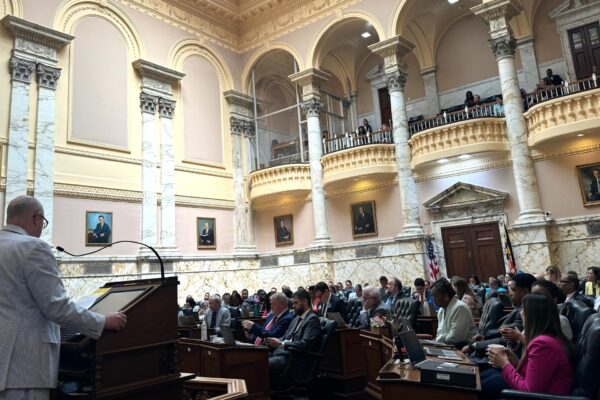
Maryland House of Delegates convene on the floor April 8, 2024. Photo by William J. Ford.
Before the vote, a few Republicans asked several questions about the bill on the Senate floor. Sen. Chris West (R-Baltimore County), a lawyer, interjected some legalese such as “the totality of the circumstance.”
Senate Majority Leader Nancy J. King (D-Montgomery) made a motion to request a time limit on the discussion to end what appeared to be a mini-Republican filibuster to defeat the bill. The Senate voted in support of the motion, 33-13.
If the bill is signed, it will go into effect June 1.
Eight other states have enacted similar legislation in the last two years.
“Today is a momentous day in Maryland’s fight to end gun violence and hold gun manufacturers accountable,” Sen. Jeff Waldstreicher, vice chair of the Judicial Proceedings Committee and sponsor of the Senate version of legislation, said in an emailed statement.
Abortion clinics get extra security
A bill to create a grant funding program for reproductive health clinics to bolster security at their facilities is on its way to the governor’s desk. It was one of the last bills to pass.
SB 975, sponsored by Sen. Sarah K. Elfreth (D-Anne Arundel), squeezed out of the House Appropriations Committee on Monday afternoon and was brought to the House floor for consideration around 9 p.m.
The bill gives the governor the authority to carve out $500,000 to go towards clinics that offer abortion services, as pro-abortion advocates say violence and vandalism at these facilities have increased since the overturning of federal abortion protections in Roe v. Wade.
House Republicans argued that so-called pregnancy crisis centers in Maryland have received harassment from pro-abortion advocates and deserve similar funding and protections.
Crisis pregnancy centers are generally clinics that aim to discourage pregnant people from seeking abortions and instead urge them to carry their pregnancies to term, but they have long been scrutinized for providing misleading information to clients about abortion.
Del. April Miller (R-Frederick) offered a floor amendment to allow the grant funding to go towards such anti-abortion facilities in addition to clinics that provide abortion services.
“Why would we specifically make a grant program that would only be for groups that provide abortion when they’re all doing women’s health care?” Miller posed. Half a dozen Republican delegates spoke in support of her amendment.
Miller’s amendment failed on a 37-96 vote, however. The House then approved SB 975 on a 100-35 line. After a final review from the Senate, where it passed 33-12, the legislation now heads to Moore’s desk.
Correctional ombudsman bill passes
A measure to oversee Maryland’s prison system through a correctional ombudsman’s office received final approval Monday evening.
The measure, which now heads to the governor’s desk for his signature would assess programs by the state Department of Public Safety and Correctional Services (DPSCS).
The bill sponsor, Sen. Shelly Hettleman (D-Baltimore County), has worked on the legislation with several criminal justice advocates for three years.
“This is not meant to be adversarial in any way. It’s really meant to be collaborative. The correctional system has correction in its name for a reason,” she said in an interview during a session break Monday night. “It is about holding people accountable, but it’s [also] about rehabilitation. We need to look at the system and make sure it’s doing both of those objectives in the way that advances our values as a state.”
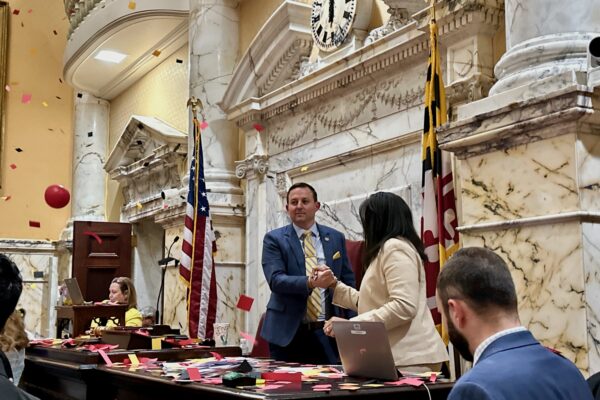
Senate President Bill Ferguson (D-Baltimore City) clasps hands with Sally Robb, his chief of staff, at the close of the 90th day of the 2024 legislative session. Photo by Bryan P. Sears.
Under Senate Bill 134, the ombudsman’s office would conduct independent reviews and assessments of various programs administered by DPSCS such as health and mental health services and educational and vocational programs, and resolve conflicts with a person incarcerated, an employee, or a contractor with the agency.
The ombudsman’s office would also be allowed to interview correctional personnel, or a person incarcerated, and make unannounced visits and on-site inspections of facilities.
The state’s Juvenile Justice Monitoring Unit, an independent agency currently within the attorney general’s office, would move into the ombudsman office.
Higher education program bill passes, with a caveat
It took the full 90 days, but a measure governing higher education programs did get through the legislature.
House Bill 1244 is designed to improve the approval process for higher education programs at state universities.
But a conference committee was necessary to work out the two chambers’ differences on a variety of amendments. The approval process for new higher ed programs is administered by the Maryland Higher Education Commission (MHEC).
Dels. Ben Barnes (D-Prince George’s and Anne Arundel), Stephanie Smith (D-Baltimore City) and Carl Anderton Jr. (R-Wicomico) represented the House. The opposite chamber was represented by Senate President Pro Tem Malcolm Augustine (D-Prince George’s) and Sens. Brian Feldman (D-Montgomery) and Jason C. Gallion (R-Harford and Cecil).
With minutes left before the legislative session ended, after the two sides reconciled their differences, a clerical error was discovered in the conference committee report.
Nine pages of amendments that are currently online are not what the conference committee agreed to.
The main provision deals with the creation of an emerging workforce graduate level program.
In the previous House version, the workforce program would allow the state’s four historically Black colleges and universities — Morgan State, Bowie State and Coppin State universities and the University of Maryland Eastern Shore — and the University of Maryland, College Park, to submit proposals to implement an emerging workforce program.
However, the Senate version didn’t include that provision.
Before the bill goes into effect July 1, the legislature will send a letter-of-intent about the bill to the higher ed commission. What will not be included is the provision on HBCUs to submit proposals for new emerging workforce programs — but what will happen next isn’t altogether clear.
“We’ll make sure the public and higher education communities are aware of what we send to MHEC that this isn’t over,” said Smith, who didn’t know how the error occurred.
Protections for electricity consumers
After some uncertainty as Monday dawned, the two chambers of the legislature gave final passage to a bill designed to protect customers in Maryland’s deregulated retail electricity market from unscrupulous sellers of electric power.
Several companies, including energy giants like NRG and Constellation, compete with monopoly utilities to sell electric power to customers. But the marketplace has become defined over the past quarter century by energy retailers that prey on poor and elderly customers and sell power contracts that may start out as inexpensive but eventually balloon in price.
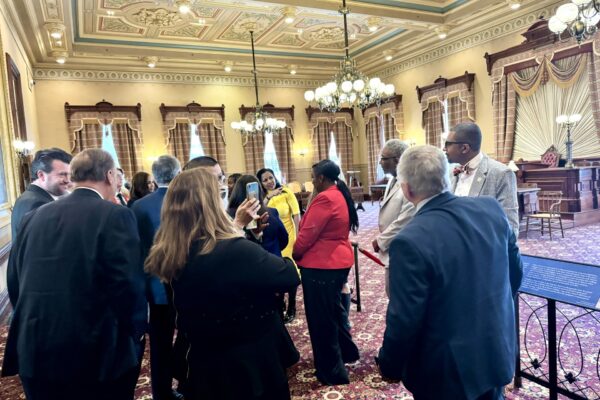
The House Ways and Means Committee held a brief meeting in the Old House Chamber of the Maryland State House Monday. Photo by William J. Ford.
Senate Bill 1 lays out extra protections for consumers and requires people who sell retail electricity contracts to get state-issued licenses.
The concept was broadly popular with the legislature’s Democratic supermajorities, but the bill hit a snag in recent days after the House attached a complicated amendment to the measure that would have prevented Constellation from building a data center on the property of its Calvert Cliffs nuclear plant in Lusby.
By afternoon, the Senate and House had appointed conference committees to resolve their differences, but the House quickly receded from its position and struck the controversial amendment. The vote on the final version of the measure Monday was 32-15 in the Senate and 96-39 in the House.
“SB 1 brings accountability and transparency so customers can make an informed choice,” said Tammy Bresnahan, AARP Maryland’s senior associate state director for advocacy. The seniors’ group had been working to pass more consumer protections in the retail energy marketplace.
“The industry and their teams of high-paid lobbyists fought tooth and nail against this legislation, but, in the end, it is Maryland ratepayers who prevailed,” Bresnahan said.
Several large energy companies said the legislation would decimate the state’s competitive marketplace and have threatened to leave the state if the legislation passed. They have appealed to Moore to veto the measure, but it seems unlikely that he will.
Also passing Monday night:
An emergency bill that retroactively extends the deadline for the State Department of Assessments and Taxation to mail more than 100,000 updated property tax assessments.
The agency missed a deadline to mail the new assessments to owners of properties in every county and Baltimore City. Failing to correct the issue could cost local and municipal governments nearly $200 million over three years.
Michael Higgs was removed as director of the agency last week.
Lawmakers this year rejected expanding gambling options in Maryland with iGaming, which allowed casino-style games on phones and other electronic devices. Some opponents worried unfettered access to gaming at home would lead to more gaming addictions.
But the General Assembly did pass legislation legalizing local retail delivery of alcoholic beverages using third-party delivery services.
That development was applauded by companies that advocated for the change this year.
“Bringing responsible alcohol delivery by a third party to Maryland is a big win for consumers, merchants, and Dashers, who will all now be able to benefit from the opportunities that delivery can unlock,” said Chad Horrell, DoorDash senior manager of government relations in Maryland. “We’re deeply committed to ensuring that alcohol deliveries are done safely in 31 other states across the country and look forward to helping Maryland communities enjoy these same benefits.”







 Creative Commons Attribution
Creative Commons Attribution